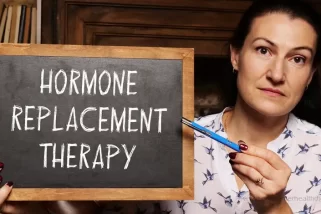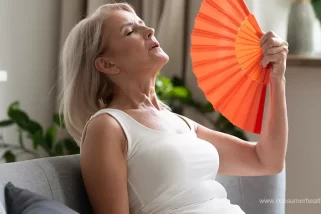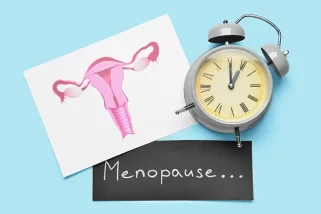Overview
It's no secret that a person's sexual desire can change hourly or even daily. However, did you know that how active or passive your libido may be is mostly determined by your monthly menstrual cycle? Every month, your hormones take you on an incredible rollercoaster ride that might have a significant effect on your sex drive. [1]

Let's talk about how your menstrual cycle influences your need for closeness and how you can accept these normal changes in your life.
The Menstrual Phase: A Mixed Bag of Desire
Hormones such as progesterone and estrogen are lowest during menstruation. This may result in less sexual desire for certain women. The concept of intimacy may seem undesirable due to the physical discomfort of cramps, bloating, and weariness. Some, though, may feel more attracted to someone during this stage. Menstrual bleeding increases blood flow and produces natural lubrication, which can heighten arousal and intensify orgasms. Additionally, some women's libido may experience a psychological boost due to the minor drop in the risk of pregnancy during menstruation.
The Follicular Phase: A Slow Awakening
Estrogen levels begin to climb as your menstrual cycle concludes, readying your body for ovulation. Like a soft spring wind, this hormonal change can reawaken your desire for sexual activity. During this phase, many women report feeling more aroused, experiencing more intense sexual fantasies\, and wanting more intimate touch. Your body gets ready for a possible pregnancy when your estrogen levels rise, which also intensifies your desire. [2]
The Ovulation Phase: The Peak of Passion
Many women experience an increase in their desire for sex when their estrogen levels rise right before ovulation. You may experience increased sensitivity during this window of fertile times, particularly in the breasts and nipples. Elevated libido can lead to more frequent intimacy or solo exploration, and enhanced lubrication can make sex more enjoyable. It makes logical from an evolutionary perspective that this rise in desire around ovulation enhances the likelihood of pregnancy during your most fertile days. [3]
The Luteal Phase: The Passion Drought
Progesterone levels increase and estrogen levels begin to decrease following ovulation. This hormonal change can reduce sexual desire in a lot of women. The development of premenstrual symptoms such as bloating, mood swings, exhaustion, and irritability can further reduce the desire for intimacy, and the increasing progesterone levels can further reduce libido. Some women may go through this stage feeling uninterested in having sex, while others may notice a more gradual decline in desire. [4]
Factors Beyond Hormones: The Bigger Picture
Hormones are not the only factors that influence your sexual desire during your cycle, but they do play a significant effect. Regardless of where you are in your cycle, factors such as stress, relationship dynamics, medication, sleep quality, body image, and general well-being can all affect your libido. Furthermore, each woman's experience is different, and some may not experience noticeable changes in desire during their cycle. [5]
Embracing the Rhythm: Tips for Navigating Your Cycle
1. Monitor your cycle: You may better predict and comprehend your body's tendencies by monitoring the variations in your libido and your menstrual cycle.
2. Be open with one another: Talk to your partner about your desires and experiences. You and your partner can navigate your changing wants together and develop understanding via open conversation.
3. Investigate your pleasure: If you're feeling particularly lustful, treat yourself to some alone time or get a good vibrator. When your libido is down, don't push yourself; instead, concentrate on taking care of yourself.
4. Handle stress: Anxiety can stifle desire, so give priority to methods of relaxation like yoga, meditation, or just setting aside time for things you enjoy.
5. Show kindness and patience: Don't criticize or condemn yourself for having erratic libido swings. Accept your cycle's inherent pattern and pay attention to what your body requires.
Conclusion
Hormonal dances during your menstrual cycle might have a big impact on your desire for sexual activity. You may better predict and accept the ups and downs of your libido by being aware of the patterns and sensitive to your body's cues. Never forget that sexual desire is an extremely personal experience with no “normal” state. [6] The secret is to be honest with your partner, take care of yourself, and accept the specific cycles. Recognize that desire will come and go like the tides, so enjoy the highs and ride out the lows.
6 Sources
We review published medical research in respected scientific journals to arrive at our conclusions about a product or health topic. This ensures the highest standard of scientific accuracy.
[1] Stanislaw H, Rice FJ. Correlation between sexual desire and menstrual cycle characteristics. Arch Sex Behav. 1988 Dec;17(6):499-508. doi: 10.1007/BF01542338. PMID: 3223811.[2] Sorokowski P, ?ela?niewicz A, Nowak J, Groyecka A, Kaleta M, Lech W, Samorek S, Stachowska K, Bocian K, Pulcer A, Sorokowska A, Kowal M, Pisanski K. Romantic Love and Reproductive Hormones in Women. Int J Environ Res Public Health. 2019 Oct 31;16(21):4224. doi: 10.3390/ijerph16214224. PMID: 31683520; PMCID: PMC6861983.
[3] Holesh JE, Bass AN, Lord M. Physiology, Ovulation. 2023 May 1. In: StatPearls [Internet]. Treasure Island (FL): StatPearls Publishing; 2024 Jan–. PMID: 28723025.
[4] Holesh, J. E., Bass, A. N., & Lord, M. (2023). Physiology, Ovulation. StatPearls [Internet]. StatPearls Publishing. Retrieved from https://www.ncbi.nlm.nih.gov/books/NBK441996/#:~:text=unless%20fertilization%20occurs.-,Luteal%20Phase,able%20to%20make%20sufficient%20progesterone%20to%20support%20the%20pregnancy.%5B10%5D,-Go%20to%3A
[5] Bullivant SB, Sellergren SA, Stern K, Spencer NA, Jacob S, Mennella JA, McClintock MK. Women's sexual experience during the menstrual cycle: identification of the sexual phase by noninvasive measurement of luteinizing hormone. J Sex Res. 2004 Feb;41(1):82-93. doi: 10.1080/00224490409552216. PMID: 15216427.
[6] Slob AK, Bax CM, Hop WC, Rowland DL, van der Werff ten Bosch JJ. Sexual arousability and the menstrual cycle. Psychoneuroendocrinology. 1996 Aug;21(6):545-58. doi: 10.1016/0306-4530(95)00058-5. PMID: 8983090.







 This article changed my life!
This article changed my life! This article was informative.
This article was informative. I have a medical question.
I have a medical question.
 This article contains incorrect information.
This article contains incorrect information. This article doesn’t have the information I’m looking for.
This article doesn’t have the information I’m looking for.